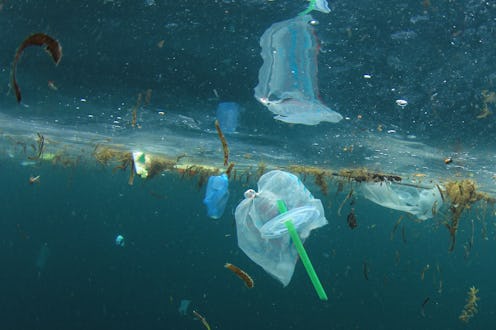
Single-use plastic is on its way out — Sea World, Royal Caribbean and IKEA have all recently banned plastic straws and bags, according to The Washington Post, and cities around the globe are starting to ban plastic straws in restaurants at a rapid pace. We know that plastic is catastrophic for our oceans, and there are a ton of reasons to cheer a cultural shift that's said to bring sustainability and save ocean animals. But a straw ban may not be as sustainable as you may think it is, and there are things we need to consider as we try to make the world a better place.
There are myriad environmental benefits to reducing or eliminating single-use plastics, which aren't recyclable more often than not. But it's important to move towards a more sustainable future in a way that doesn't make life more difficult for people who rely on plastic. Straws have been the particular focus of attention in recent years, David M. Perry writing for Pacific Standard notes, following a viral video of a sea turtle with a straw in its nose, even though straws haven't been shown to be a particularly large source of plastic pollution in our oceans. If we're thinking about solutions to the problem of single-use plastics, we need to consider options that don't cause undue harm and that are truly sustainable, in every sense of the word. Here are a few reasons that plastic straw bans might not be as sustainable as you'd think.
1People With Disabilities Rely On Plastic Straws
Many disability advocates have suggested that the movement to ban plastic straws has ableist overtones. For some disabled people, plastic straws make it possible to drink without assistance, both at home and out in restaurants. "I’m accustomed to having straws readily accessible to me when I’m out in public," Robyn Poweel wrote for a HuffPost op-ed. "And as more and more cities and states seek to ban them, I’ve gotten concerned about the unintended consequences these bans will have on people with disabilities. How will I drink if straws are no longer available?" Moreover, suggesting that disabled folks carry around reusable straws as a workaround is unfeasible, Perry writes for Pacific Standard, as it not only places the responsibility of access on disabled folks, but also can potentially be uncomfortable for people with sensory processing issues. We need to be more conscious of our environmental waste and of the needs of disabled people at the same time.
2Replacements May Not Be As Great For The Environment As We Think
New Zealand's Star Media breaks down the difference between plastic straws and other popular straw materials. While plastic isn't good for the environment, options like paper and compostable straws aren't always great for our planet, either, thanks to the impact of producing and shipping them. When you get rid of plastic, it's important to do your research to make sure the replacement is eco-friendly, or you may end up still doing harm.
3It Can Be Classist, Too
One of the lures of non-plastic straws is their reusability — instead of throwing away a plastic straw after one drink, you'll be able to wash a straw and use it multiple times. But for people who don't have access to full kitchens, it can be difficult to commit to reusable straws, which can be difficult to wash. Additionally, rather than getting a plastic (or even compostable) straw for free at restaurants, as is the custom currently, the burden would be placed on individuals to purchase their own straws (which aren't super expensive, but aren't cheaper than a free plastic straw) and then carry them back to their own home to wash. The restaurants who'd need to comply with this new regulation could implement reusable straws in their own dining rooms, of course, but it would be incredibly difficult to implement this on a wide scale. It's hard to ignore that a nationwide ban could make life harder for people who live in low-income communities.
4It Can Encourage Slacktivism
No one should have to feel bad about making an effort to make a difference in their community — baby steps are still steps, after all. But any time people are encouraged to make tiny changes, we risk lulling them into a false sense of comfort that they've made more of a difference than they actually have, and demotivating them from making further, effective changes.
Of course, it's not okay to shout people down because we think they're not doing enough, but long-scale environmental change will only happen when we change the way we think about the environment and our own carbon footprints, and start truly thinking about what sustainability looks like. Many of us — including myself — aren't as considerate as we could be when it comes to the environment, but something has to change. A plastic straw ban would reduce waste, but it could also introduce unforeseen problems. Before campaigning for a straw ban in your city, read up on the issue, and listen to the people who would be most affected by the change.